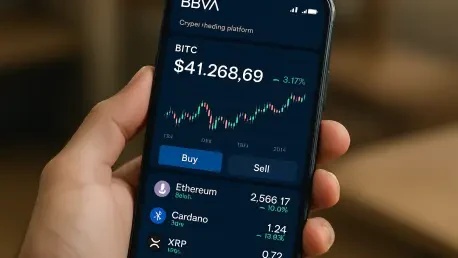In a world where digital currencies are rapidly reshaping financial landscapes, Spain’s second-largest bank, BBVA, has taken a monumental step by launching 24/7 cryptocurrency trading for its retail clients. This pioneering move, rolled out on October 2, integrates Bitcoin and Ether trading directly into BBVA’s mobile banking app, making Spain a focal point for innovation in traditional finance. With growing consumer interest in digital assets, this roundup gathers insights, opinions, and perspectives from industry leaders, analysts, and financial experts to explore the implications of BBVA’s initiative. The purpose is to provide a comprehensive view of how this development is perceived across the sector, what it means for retail investors, and how it could influence the broader European banking industry.
Exploring Industry Reactions to BBVA’s Crypto Milestone
A Bold Step Forward in Retail Banking
Industry observers have hailed BBVA’s integration of cryptocurrency trading as a transformative moment for retail banking in Europe. Many note that embedding Bitcoin and Ether trading within an existing mobile app offers unparalleled accessibility, allowing everyday users to engage with digital assets without navigating unfamiliar platforms. This seamless approach is seen as a game-changer, particularly for those hesitant about crypto due to security concerns.
Financial analysts emphasize that BBVA’s decision reflects a deep understanding of current market demands. The consensus among several banking consultants is that customers increasingly seek trusted institutions to manage their digital investments. This move positions BBVA as a leader in meeting those expectations, potentially setting a new standard for how banks interact with emerging asset classes.
Some skeptics, however, caution that widespread adoption may face hurdles such as user education and market volatility. Despite these concerns, the general sentiment leans toward optimism, with many believing that BBVA’s regulated environment could help mitigate risks and build consumer confidence in cryptocurrencies over time.
Technological Innovation Driving Adoption
BBVA’s partnership with Singapore-based SGX FX for pricing and risk management tools has drawn significant attention from tech and finance experts. Several industry commentators point out that leveraging third-party solutions allows banks to adopt crypto trading without the burden of developing complex in-house systems. This collaboration is viewed as a smart strategy that could lower entry barriers for smaller institutions looking to enter the market.
On the flip side, a segment of cybersecurity specialists warns of potential risks tied to technological dependencies. They argue that reliance on external platforms could expose banks to vulnerabilities if not managed with robust safeguards. Nevertheless, the prevailing opinion is that such partnerships are essential for scaling crypto services efficiently in a competitive landscape.
A few fintech innovators also highlight that this trend of adopting external tech solutions signals a shift toward greater collaboration in the financial sector. They predict that BBVA’s success could inspire a wave of similar alliances, accelerating the integration of digital assets into mainstream banking across Europe and beyond.
Regulatory Framework as a Foundation for Growth
The role of the European Union’s Markets in Crypto-Assets (MiCA) framework in enabling BBVA’s initiative has sparked varied reactions among regulatory experts. Many commend the clarity provided by MiCA, viewing it as a critical enabler for banks to offer crypto services under a structured legal umbrella. This perspective holds that BBVA’s compliance with national and EU regulations sets a positive precedent for others.
Contrasting views emerge from some policy analysts who argue that while MiCA offers a foundation, regional differences in implementation could create uneven playing fields. They suggest that harmonization of crypto policies across member states remains a work in progress, potentially slowing adoption in less progressive markets compared to Spain.
Despite these differences, there is broad agreement that regulation is not a barrier but a catalyst for innovation when designed thoughtfully. Experts in financial law stress that BBVA’s ability to secure authorization from Spain’s National Securities Market Commission (CNMV) demonstrates how regulatory frameworks can support rather than stifle advancements in digital finance.
Strategic Positioning in Investment Trends
BBVA’s broader vision of positioning crypto as a core investment asset has elicited strong opinions from wealth management professionals. Many applaud the bank’s guidance, particularly through its Swiss arm, to allocate a small but significant portion of high-net-worth portfolios to digital currencies. This advice is seen as a bold signal of institutional confidence in the long-term value of cryptocurrencies.
Comparatively, some investment advisors note that other major banks like KBC and Deutsche Bank remain cautious, focusing more on blockchain exploration than direct retail crypto offerings. This hesitation leads to debates about whether BBVA’s proactive stance could pressure competitors to rethink their strategies or risk losing market share to more agile players.
A smaller group of traditional financial planners questions whether retail investors are ready for such exposure, given the inherent risks of digital assets. Yet, the dominant view among portfolio strategists is that BBVA’s approach could redefine diversification norms, encouraging a gradual shift toward including crypto in mainstream investment planning.
Key Takeaways from Diverse Perspectives
Gathering insights from various corners of the financial world reveals a multifaceted picture of BBVA’s crypto trading launch. Industry leaders largely celebrate the seamless integration into everyday banking apps as a step toward democratizing digital assets, while tech experts underscore the importance of partnerships in overcoming operational challenges. Regulatory commentators view MiCA as a vital framework, though they acknowledge the need for consistency across regions. Meanwhile, investment professionals see BBVA’s strategy as a forward-thinking move, even as some express caution about market readiness.
Reflecting on a Historic Shift
Looking back, the discussions surrounding BBVA’s launch of 24/7 crypto trading highlight a pivotal moment in blending traditional finance with digital innovation. The diverse opinions gathered underscore both the excitement and the challenges of this transition. For banks considering similar moves, the next steps involve prioritizing regulatory alignment and investing in secure technological solutions to meet consumer demand. Retail investors, meanwhile, can benefit from staying informed about such offerings in their regions and exploring regulated platforms for diversified investments. As the landscape continues to evolve, tracking these developments will be crucial for all stakeholders in the financial ecosystem.









